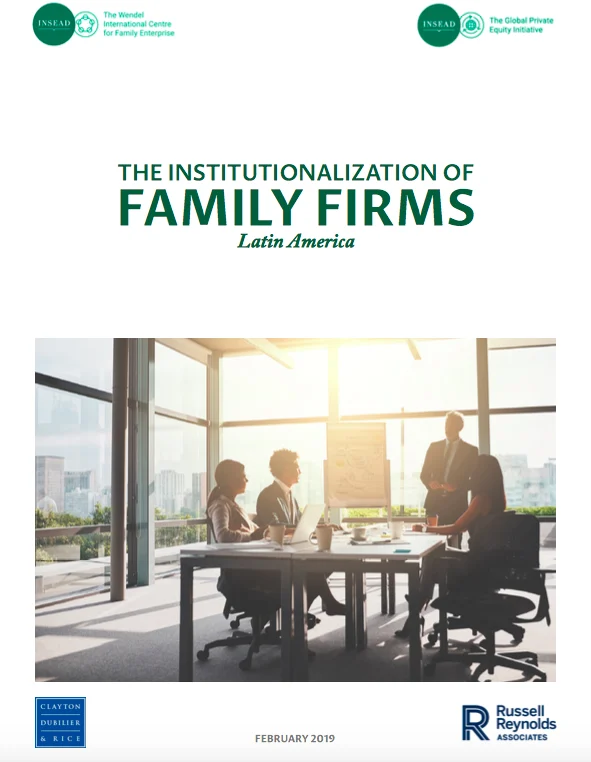 Over the last several years, INSEAD’s Global Private Equity Initiative (GPEI) has been examining a key section of the global economy: Family Firms.
Over the last several years, INSEAD’s Global Private Equity Initiative (GPEI) has been examining a key section of the global economy: Family Firms.
As we noted in a podcast with Claudia Zeisberger, Senior Affiliate Professor of Entrepreneurship and Family Enterprise and the Academic Director of GPEI, the previous report was titled “The Institutionalization of Family Firms” and was based based on interviews 123 Asia-based family firms and 14 private equity professionals. Among the questions it addressed: How Can Family Firms Ensure Long-Term Value Creation?
That study notes: “As family firms account for 70% of GDP in the global economy and 60% of global employment, the importance of long-term value creation extends beyond individual families – it is among the main drivers of economic growth and business innovation, as well as livelihoods.”
Listen to the podcast — and see the full transcript — of our conversation with Claudia Zeisberger on “The Institutionalization of Family Firms”
INSEAD has released a new report — The Institutionalization of Family Firms: A Look at Latin America.
As the authors write: “Family owned and controlled firms form the backbone of Latin American economies, accounting for 75% of all $1 billion-plus businesses in the region and 60 percent of its aggregate GNP. It follows that family businesses must create value and thrive for the economic well-being of their home countries. So how can family firms ensure long-term value creation?”
It continues: “As family businesses mature it is critical that they embark on a process of institutionalization whereby they introduce and embed formal policies and procedures that strengthen commitment to their mission and values, preserve their competitive advantage and facilitate long-term growth.”
Said Zeisberger: “More work is needed for a complete picture, but without doubt, family businesses hold up a significant part of the macro-economic sky and connecting them in a global network remains the target of INSEAD and its centers.”
For the Latin America report, “INSEAD surveyed 131 family firms and interviewed select PE experts to understand the dynamics of the region. This report examines how institutionalization can help a family business secure its long-term survival and unlock growth. It includes an analysis of the survey results and individual case studies that can help family firms understand their own strengths and weaknesses and learn from their peers. It also explores partnership opportunities between family firms and PE investors and uncovers areas of best practice that support sustainable value creation.”
Why Institutionalization Matters
The question of why institutionalization matters is key for family firms — and for understanding the role they play in regional and global economies. INSEAD Knowledge notes: “This process of institutionalisation is indeed crucial given that less than 15 percent of family firms are led by a third-generation family member, and about two-thirds of family firms will either be sold by the founder or go out of business. Such failures are usually caused by succession planning difficulties, talent management challenges, deficiencies in leadership and governance, and decision-making weaknesses.”
Said Morten Bennedsen, The André and Rosalie Hoffmann Chaired Professor of Family Enterprise Professor of Economics and Political Science Academic Director, Wendel International Centre for Family Enterprise: “Long Term Planning and professionalization related to the transition of family firms across genera ons is without doubt the biggest challenge of most family businesses worldwide. Our report gives local examples and global perspectives on how to avoid looming disruption and conflict in family rms. Our hope is that the report will also inspire La n American family firms to become long lasting and sustainable family businesses”
The report contributes important insights to the sector and region. Said Thomas C. Franco Partner at Clayton, Dubilier & Rice:
“Partnerships between private equity investors and family enterprises will continue to grow across the globe because of the favorable outcomes they have often achieved. INSEAD has established itself as an academic leader in understanding the dynamics of these rewarding partnerships by examining the broader challenges and opportunities facing family-owned businesses globally and, in this report, in Latin America. Importantly, INSEAD’s valuable perspective provides a foundation for a much deeper dialogue about how families can create sustainable long-term value for their multiple constituencies.”
In our next post, we’ll review the survey findings around six key attributes:
- Growth capabilities
- Organizational design
- Corporate governance and leadership
- Access to capital
- Intangible family assets
- Family ownership and succession
Citations
- https://www.insead.edu/faculty-research/faculty/claudia-zeisberger
- https://www.insead.edu/sites/default/files/assets/dept/centres/gpei/docs/The_Institutionalization_of_Family_Firms_Latin_America_Mar_2019.pdf
- https://centres.insead.edu/global-private-equity-initiative/research-publications/documents/insead-the-institutionalization-of-family-firms-2017.pdf
- https://knowledge.insead.edu/economics-finance/latin-american-family-firms-and-the-path-to-longevity-11331
- https://www.insead.edu/faculty-research/faculty/morten-bennedsen
- https://www.cdr-inc.com/
